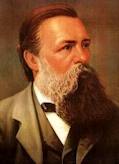Friedrich Engles

Engles became a communist in 1842 and discovered the proleteriate of England when he took over the management of the Manchester factory belonging to his father’s cotton firm. In 1844, the year he began his close association and friendship with Marx. Engles was finishing his Outline of a Critique of Political Economy. This remarkable study contained in seminal form the critique that Marx was to make of bourgeois political economy in Das Kapital.
He collaborated with Marx in the writing of The Holy Family, The German Ideology, and The Communist Manifesto. The correspondents between them is of fundamental importance for the student of Das Kapital, for it shows how Engles contributed by furnishing Marx with a great mount of technical and economic data and by criticizing the successive drafts. This collaboration lasted until Marx’s death and was carried on posthumously with the publication of the manuscripts left by Marx, which Engles edited, forming volumes 2 and 3 of Das Kapital.
In response to criticism of Marx’s ideas by a socialist named Engles Duhring, Engles published several articles that were collected under the title Anti)Duhring. Anti)during is of Fundamental importance for it constitutes the link between Marx and certain forms of modern Marxism. It contains three parts: Philosophy, Political Economy, and Socialism. In the first, Engles attempts to establish that the natural sciences and even mathematics are dialectical, in the sense that observable reality is dialectical: the dialectical method of analysis and thought is imposed on men by the material forces with which they deal. It is thus rightly applied to the study of history and human society. “Motion, in affect, is the mode of existence of matter,” Engles writes. In using materialistic dialectic to make a critique of Dihring’s thesis, according to which political forces prevail over all the rest in the molding of history, Engles provides a good illustrations of the materialistic idea of history, which puts the stress on the prime role Political economy form a very readable introduction to the principal economic ideas of Marx: value *simple and complex, labor, capital, and surplus value. The section Socialism start by formulating anew the critique of the capitalist system as it was made in Das Kapital. At the end of the chapter devoted to production, distribution, the state, the family, and education, Engels outlines what the socialist society will be like, a society in which the notion of value has no longer anything to do with the distribution of the goods produced because all labor” becomes at once and directly social labor,” and the amount of social labor that every product contains no longer needs to be ascertained by” a detour.” a production plan we coordinate the economy. The division of labor and the separation of town and country will disappear with the” suppression of the capitalist character of modern industry.” Thanks to the plan, industry will be located throughout the country in the collective interest, and thus the opposition between town and country will disappear- to the profit of both industry and agriculture. Finally, after the liberation of man from the condition of servitude in which the capitalist mode of production holds him, the state will also be abolished and religions will disappear with “natural death.” One of the most remarkable features of Anti-Duhring is the insistence with which Engels refuses to base socialism on absolute values. He admits only related values, linked to historical, economic, and social conditions. Socialism cannot possible be based on ethical principle: each epoch can only successfully carry out that that of which it is capable. (Riddling, 2001) Download